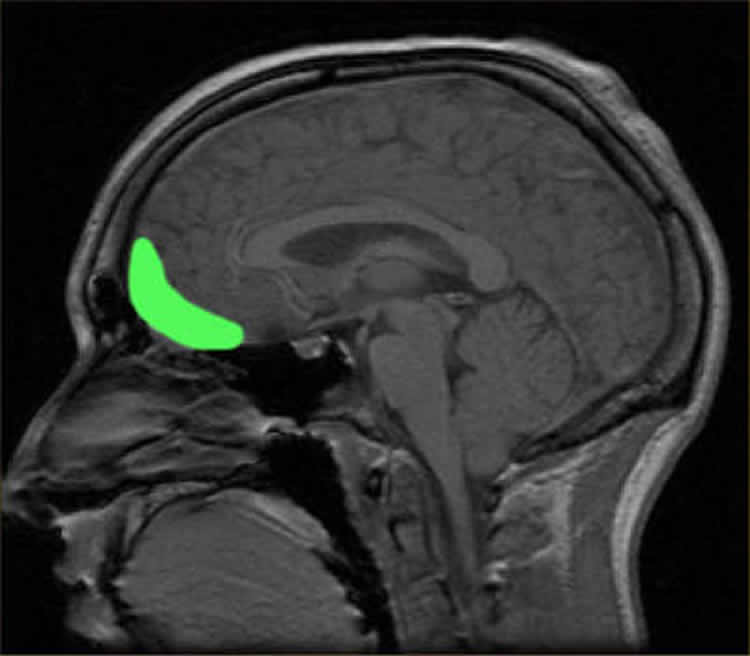Summary: Researchers reveal the role the orbitofrontal cortex plays in identity expectations.
Source: Northwestern University.
When scientist Thorsten Kahnt was a high school student in Nuremberg, Germany, his friend Christian sported chin-length, curly brown hair. Then one day Christian appeared with newly buzzed hair, only half an inch long.
When Kahnt saw his newly shorn friend, his midbrain blinked, “Error! Error!”
At least, that’s what Kahnt knows now, based on his new Northwestern Medicine study about how neurons in the midbrain encode errors in our identity expectations and how the orbitofrontal cortex updates them.
“This happens all the time in our lives,” said Kahnt, an assistant professor of neurology at Northwestern University Feinberg School of Medicine. “Whenever there’s a mismatch between what we expect to experience and what we actually experience, our brain has to register the error and update our expectation. These changing expectations are fundamental for making decisions. Now we know how this happens in the brain.”
“It could be as basic as taking your kid to the park and expecting green grass, but instead the ground is a big, muddy puddle,” Kahnt said. “Your midbrain responds to the error, and the orbitofrontal cortex updates the information, so you know what to expect tomorrow.”
The paper describing the human midbrain’s role in identity expectations will be published April 23 in Nature Communications.
Previous research has identified the midbrain’s role in learning about preferences. This is the first paper to show its role in encoding identity errors and how those are used to update expectations in the orbitofrontal cortex.
Kahnt believes these identity errors are encoded by dopamine neurons because these neurons also encode errors that relate to our preferences. Presumably, dopamine is released at the neuron’s axon terminal in the orbitofrontal cortex where it updates the identity information.
In addition, a recent paper reporting a similar experiment in rodents showed dopamine neurons in the midbrain encode errors in identity expectations.
How the study worked
To create different identities of outcomes, the scientists used odors corresponding to sweet and savory foods. Hungry participants learned associations between visual stimuli and these food odors by observing pairs repeatedly. Unexpectedly to the participant, after some time researchers changed the identity of the expected odor. They presented a different food odor (e.g., pot roast), after participants saw a visual stimulus that was previously paired with a different odor (e.g., caramel).

Functional magnetic resonance imaging (fMRI) data showed that when an unexpected odor was presented, activity in the midbrain increased. Moreover, the study showed that at the time when the visual stimulus was presented, patterns of fMRI activity in the orbitofrontal cortex encoded the identity of the odor that was expected.
Once the association between the stimulus and the odor was changed, these “identity expectations” changed accordingly. Further analyses showed that identity expectations in the orbitofrontal cortex changed proportionally to the size of responses in the midbrain.
James Howard, a postdoctoral fellow at the Feinberg School of Medicine, is the first author of the study.
Funding: The research was supported by the National Institute on Deafness and Other Communication Disorders (grant R01DC015426) of the National Institutes of Health.
Source: Marla Paul – Northwestern University
Publisher: Organized by NeuroscienceNews.com.
Image Source: NeuroscienceNews.com image is in the public domain.
Original Research: Open access research for “Identity prediction errors in the human midbrain update reward-identity expectations in the orbitofrontal cortex” by James D. Howard & Thorsten Kahnt in Nature Communications. Published April 23 2018.
doi:10.1038/s41467-018-04055-5
[cbtabs][cbtab title=”MLA”]Northwestern University “How Your Brain Learns to Expect Muddy Puddles in the Park (and Other Things).” NeuroscienceNews. NeuroscienceNews, 23 April 2018.
<https://neurosciencenews.com/brain-expectations-8860/>.[/cbtab][cbtab title=”APA”]Northwestern University (2018, April 23). How Your Brain Learns to Expect Muddy Puddles in the Park (and Other Things). NeuroscienceNews. Retrieved April 23, 2018 from https://neurosciencenews.com/brain-expectations-8860/[/cbtab][cbtab title=”Chicago”]Northwestern University “How Your Brain Learns to Expect Muddy Puddles in the Park (and Other Things).” https://neurosciencenews.com/brain-expectations-8860/ (accessed April 23, 2018).[/cbtab][/cbtabs]
Abstract
Identity prediction errors in the human midbrain update reward-identity expectations in the orbitofrontal cortex
There is general consensus that dopaminergic midbrain neurons signal reward prediction errors, computed as the difference between expected and received reward value. However, recent work in rodents shows that these neurons also respond to errors related to inferred value and sensory features, indicating an expanded role for dopamine beyond learning cached values. Here we utilize a transreinforcer reversal learning task and functional magnetic resonance imaging (fMRI) to test whether prediction error signals in the human midbrain are evoked when the expected identity of an appetitive food odor reward is violated, while leaving value matched. We found that midbrain fMRI responses to identity and value errors are correlated, suggesting a common neural origin for these error signals. Moreover, changes in reward-identity expectations, encoded in the orbitofrontal cortex (OFC), are directly related to midbrain activity, demonstrating that identity-based error signals in the midbrain support the formation of outcome identity expectations in OFC.






